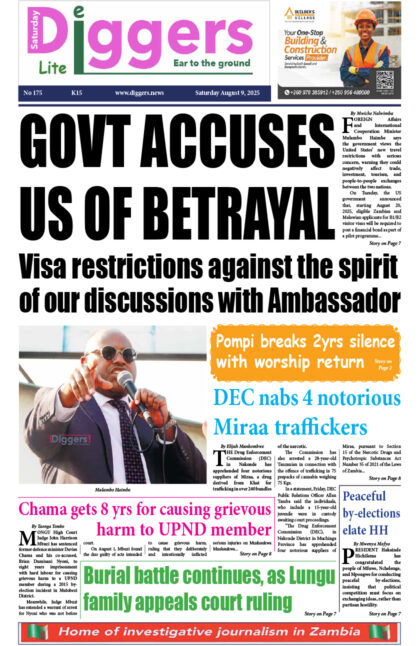Economist Professor Oliver Saasa has advised government arms to avoid differing with each other through the press saying this undermines the integrity of government policy.
And Professor Saasa has welcomed the Zambia Revenue Authority (ZRA) to support the reinstatement of VAT after seemingly being on the opposite side of the coin.
Meanwhile, Prof Saasa has encouraged citizens trained in other fields to continue interrogating government’s economic policies saying development discourse is for everyone.
Recently, ZRA boss Kingsley Chanda called Professor Saasa a hungry and angry man for questioning the manner in which he supported sales tax without undertaking any study.
Chanda also insisted that Sales Tax was the best for Zambia, leading Prof Saasa to wonder what the ZRA Commissioner General was trying to say about Minister of Finance Bwalya Ng’andu’s competence on tax matters.
But in a statement, Wednesday, Chanda applauded government’s decision to re-introduce Value Added Tax (VAT) in the 2020 budget adding that the authority would immediately work to address the compliance and administrative challenges especially falsified refund claims, double claims and transfer pricing through over invoicing.
Commenting on this in an interview, Professor Saasa noted that there were better avenues within government to solve differences of opinion without going to the press
“It is everybody’s expectation that various arms of Government maintain the position that the State has adopted and that concerted effort is made to ensure that policy statements emanating from State arms do not unduly appear to be conflictual. This speaks to the importance of policy clarity, policy consistency and policy predictability which, collectively, provide for the needed environment for thriving national growth and development. Of course government arms can differ on matters of policy. In fact, I would like to encourage differences of opinion to be accommodated within the Government system itself because it is through differing on both procedure and strategy that common ground could be sought going forward. What is important to avoid is for Government arms to differ publicly and in a manner that begins to threaten the integrity of government policy. There should be better avenues within Government to solve differences of opinion without going to the press,” Prof Saasa said.
And Prof Saasa welcomed Chanda’s decision to support the reinstatement of VAT.
“I have read with interest ZRA statement, attributed to the Commissioner-General, Mr Kingsley Chanda, to the effect that the Authority applauds the government’s decision to continue with Value Added Tax (VAT) and that the institution fully supports the decision by the Minister of Finance in the 2020 Budget Speech to undertake a comprehensive review of the tax system before consideration of Sales Tax is considered as a tax option. Of course I am thrilled to read this statement in the light of the recent posture that was, correctly or incorrectly, associated with the Authority,” he said.
Meanwhile, Prof Saasa encouraged other professionals outside government to interrogate government policy and its implementation.
“It is also important for us to agree, as a country, that, for professionals outside government, they ought to be encouraged, without any intimidation, to continually interrogate both government policy and how it is implemented – and doing this using different shades of discipline glasses. In this regard, let me take this opportunity to counsel those that believe that interest in, and commenting upon, government economic policy should be left to mainstream economists. I am really at pains to understand where all this is coming from after many decades of development discourse that professionals world-wide have unanimously concluded that development, in general, and economic development, in particular, is multi-dimensional and addressing it requires multi-disciplinary approaches that recognize the respective inputs of different specializations. To believe that specialists in these fields are subsidiary to economics when it comes to addressing the current economic challenges facing the country only speaks to the limited comprehension of economic and development issues and how problems herein should be addressed. I get concerned when I see some senior people in government listening too attentively to such people,” said Prof Saasa.
“At another level, there are fields of specialization that may appear to be distant from the mainstream economic or developmental fields such as sociology, industrial phycology, social work and the more scientific ones such as engineering, natural sciences, medicine, mining, etc. What those that are less informed about the multi-disciplinary nature of economic policy may not be aware of is that these are the real professionals on the ground and who are often better equipped to understand the real implications of economic policies and how addressing them could best be handled using their skill sets. As a Chancellor of one of the public universities here in Zambia, I would not expect those that I award degrees to come out of these higher institutions of learning thinking that they are better than other graduates because development discourse is for everybody to have an interest in – and to contribute to.”
























